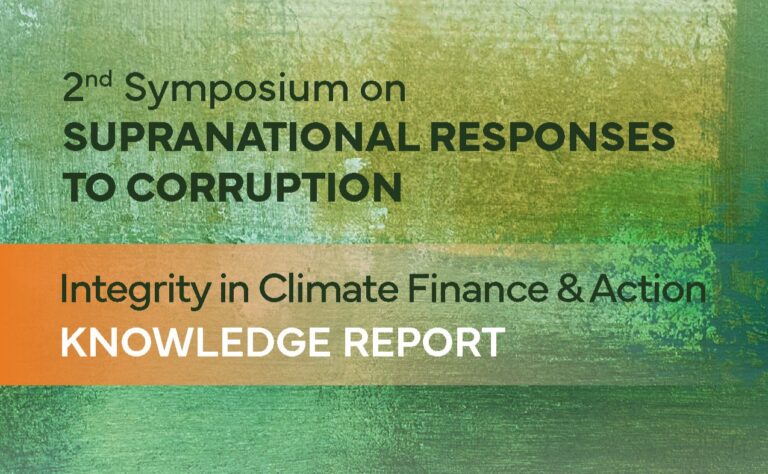2nd Symposium on Supranational Responses to Corruption: Integrity in Climate Finance & Action Knowledge Report

Download
Joana Setzer and Tiffanie Chan from the Grantham Research Institute, and Sindi Kuci (consultant), contributed to this report and hosted the Symposium at LSE.
The 2nd Symposium on Supranational Responses to Corruption: Integrity in Climate Finance and Action, held on 9-10 May 2024, highlighted the intersection of two global challenges – climate change and corruption. Hosted by the World Bank, the Green Climate Fund, and Transparency International at the London School of Economics and Political Science with support from several academic and policy institutions, the Symposium underscored the urgent need for robust integrity mechanisms to safeguard climate finance from corruption and other integrity failures.
This Knowledge Report summarises the 16 papers presented during the Symposium and the insights shared by the participants at the event. It underscores the critical role of supranational actors – specifically intergovernmental organisations, international aid agencies, corporations and private donors – in mitigating integrity risks and ensuring accountability in climate finance. It examines both integrity risks and corruption risks in climate finance.
The Symposium discussed the increasing complexity and fragmentation of climate finance, which amplifies risks of corruption and governance failures. Key challenges identified include corruption in high-risk sectors such as forestry, energy, construction, and mining. The Voluntary Carbon Market was also an object of concern for greenwashing, inflated emissions reductions, and financial misappropriation. Another risk involves project-level failures.
Connected to these challenges, increasing litigation against misleading environmental and climate claims demonstrates the legal and reputational vulnerabilities faced by entities involved in climate finance. The Symposium identified systemic vulnerabilities contributing to these risks, which were categorised into three areas:
- Integrity-related issues: weak ethical foundations, flawed contracting processes, and inadequate monitoring and financial management.
- Accountability gaps: insufficient stakeholder engagement, inadequate whistleblower protections, and ineffective judicial mechanisms.
- Transparency deficits: lack of disclosure regarding conflicts of interest, lobbying activities, and financial flows
Supranational responses that were discussed in the context of the symposium include:
1. Strengthening international coordination
2. Enhancing the role of the UNFCCC COP
3. Integrating oversight mechanisms in multilateral development banks
4. Improving transparency in beneficial ownership
5. Engaging the private sector
6. Involving private donors
7. Safeguarding the Voluntary Carbon Market
8. Recovering the loss and repairing the damage

